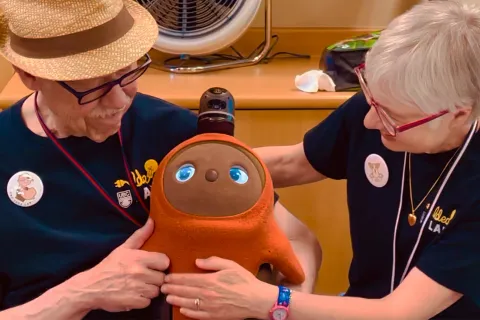Can social robots be used in elder care? UBC Nursing study aims to find out

Meet Kiwi and Mango, social robots from Japan. They may look like a cuddly cross between Teletubbies and WALL-E, but what lies beneath is advanced technology. AI enables them to learn, speak, recognize faces and voices, move around and even offer hugs, emulating the warmth of a real pet.
Kiwi and Mango are on loan to UBC for a new study exploring interactions between social robots and older adults. Dr. Lillian Hung (she/her), lead researcher, Canada Research Chair in Senior Care and assistant professor in UBC School of Nursing, explains how the study was conceived and what it could mean for elder care.
What sparked your interest in studying social robots?
Our research at the Innovation in Dementia & Aging (IDEA) Lab focuses on examining how technology and the environment impact dementia care. In Japan, where isolation and loneliness is a huge problem for older adults, Lovot robots — as their manufacturer calls them — have gained popularity as companions. I wanted to study how these robots interact with older adults and individuals with cognitive challenges in a Canadian context.
My previous research involving PARO, a robotic seal, showed that companion robots could be beneficial for people with dementia. Lovots, with their advanced AI capabilities, could hold even more promise, so I worked with their Japanese manufacturer to bring them to Canada. Canada is now part of an ongoing international study, including Hong Kong and Singapore, that is examining these human-robot interactions.
How have people responded to Kiwi and Mango thus far?
Our informal, preliminary visits to care homes, neighbourhood houses and similar places in the Vancouver region have been strongly positive. People have been warm and receptive. In one care home, an initially reserved resident surprised us by reaching out and engaging with Kiwi. His happiness just shone out.
Social robots are interesting because they’re not purely functional — they’re designed to respond to people. By their very nature, they raise questions around what it means for human beings, and specifically older adults, to seek companionship from machines in daily life. Unlike Japan, where robotic companions are more commonplace, Canada does not have a history of pet robots. Yet global trends indicate rising loneliness levels — even here.
What happens next?
Starting this month, we will be collaborating with local partner Amica Residences to introduce Kiwi and Mango to their residents, observing and recording interactions between the residents, care staff and the robots. We will also conduct interviews with care home staff and residents’ families.
Our goal is to publish and share the results to inform future directions in elder care. As different regions start to integrate companion robots in day to day life, we should be thinking about the implications of entrusting emotional and social support to machines. Does this redefine our humanity? Are robots and automation the answer to our elder care crisis? With this study, we hope to contribute some answers.



